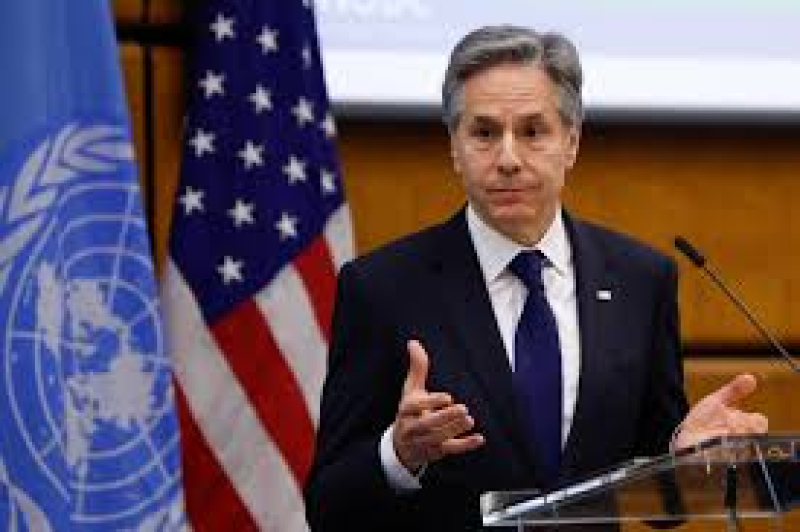- UN Chief Urges Action to Halt Mideast Escalation |
- Top Iranian Commanders Killed as Tensions Escalate |
- Multiple Arab states that host US assets targeted in Iran retaliation |
- Dhaka’s air quality 3rd worst in the world Sunday morning |
- Iran names 3-men body to cover transition as Khamenei’s dead |
US not involved in Israeli strikes on Iran, says Blinken

U.S. Secretary of State Antony Blinken said Friday the United States was not involved in Israel’s predawn aerial strike inside Iran and declined to confirm reports that Washington was notified of Israeli plans shortly before the attack.
“The reports that you've seen, I'm not going to speak to that except to say that the United States has not been involved in any offensive operations,” he said during a press conference following a meeting of the Group of Seven (G7) foreign ministers in Capri, Italy.
The G7 is focused on avoiding a wider war in the region, he said.
“You saw Israel on the receiving end of an unprecedented attack, but our focus has been on, of course, making sure that Israel can effectively defend itself, but also de-escalating tensions, avoiding conflict,” Blinken said.
Italian Foreign Minister Antonio Tajani, who chaired the G7 meeting, said the U.S. had told its G7 partners it received “last minute” information from Israel about its actions.
In the G7 communique, Blinken and other foreign ministers announced plans for new sanctions against Iran for its strikes against Israel and urged de-escalation. Tehran appears to be heeding for now.
Israel’s strikes appear to be in retaliation for the hundreds of Iranian drones and missiles launched at Israel on April 13. Most were intercepted with the help of the United States and regional allies, including Jordan and Saudi Arabia, causing no loss of life and only little damage. That suggests Iran may have calibrated the strikes to limit casualties or telegraphed advanced notice, which the White House denies.
The early Friday attacks on Iran appear to be limited, with no casualties reported immediately.
U.S. President Joe Biden has been urging Israel to exercise restraint and avoid escalation following Iran’s attacks. His administration has been coordinating with allies and partners, including the G7 on a “comprehensive response.”
These could include new sanctions on Tehran and bolstered air and missile defense and early warning systems across the Middle East, national security adviser Jake Sullivan said in a statement earlier this week.
Iranian state media reported in the early hours of Friday local time that three explosions were heard in the Iranian city of Isfahan. Explosions were reported around the same time in Iraq and Syria.
Tehran said its April 13 attacks were in response to an Israeli airstrike on Iran’s consulate in Damascus, Syria, on April 1. The bombing killed Brigadier General Mohammad Reza Zahedi and other Islamic Revolutionary Guard Corps (IRGC) commanders. Israel neither confirms nor denies responsibility for the attack.
Analysts say Israel’s limited counterattack and Iran’s muted response show that both sides are willing to avoid further escalation, at least for now. Still, the risks of escalation are higher than ever before, said Brian Katulis, senior fellow at the Middle East Institute.
"The Iran-Israel shadow conflict has turned into a low-grade open war between the two countries,” he told VOA. “The Middle East is in unchartered territory."
Israeli strikes expected
Despite U.S. pressure on Israeli Prime Minister Benjamin Netanyahu, some type of retaliatory strike by Israel was expected, said Ahmed Fouad Alkhatib, a Middle East analyst from Gaza and non-resident senior fellow at the Atlantic Council.
The Biden administration understands that Israel needs to do its own version of “face saving” retaliation after Iran's unprecedented and dramatic attacks last Saturday, he told VOA.
The party that could benefit most from any potential escalation is Hamas, said Alkhatib.
“The group has felt emboldened by Iran's direct strikes on Israel, hardening its negotiating position in the latest cease-fire and hostage exchange talks facilitated by Qatar,” he said.
Biden so far has been unsuccessful in pushing for a cease-fire deal between Israel and Hamas. Over the weekend the U.S.-designated terror group raised new demands that have thrown talks into disarray.
It’s unclear how the Israeli counterstrike on Iran could impact negotiation dynamics with Hamas, reports VOA.
“This is a moment of instability but also of opportunity,” said Laura Blumenfeld, a senior fellow at the Philip Merrill Center for Strategic Studies at Johns Hopkins School for Advanced International Studies.
“World leaders agree that the key to de-escalation is to free the hostages,” she told VOA. The message to Hamas hostage negotiators, she added, is “quit while you're behind.”

